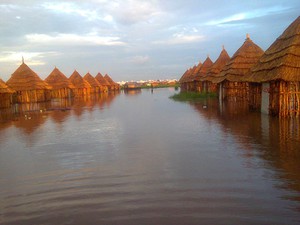Coping with natural disasters
Some towns in Ethiopia are located in areas prone to natural disasters. What are the natural disasters that have been experienced in Ethiopia?
Flooding is a problem in many parts of the country and earthquakes have also been experienced.
Water utilities in areas with a history of flooding or earthquakes should prepare adequately so that water supply is not affected. In 2014 there were serious floods in Gambela, Afar, SNNPR and Somali regions (Figure 6.8).

Figure 6.8 Flooding due to rainstorms at the Lietchuor Refugee Camp, Gambela Region, in 2014.
At times of natural disasters, the need to provide adequate and clean water to communities is crucial. There are good reasons for this. Other services such as electricity supply and transportation will be affected, limiting people’s access to safe food and health services. If clean water is also not available, the health of people will be at serious risk. Utilities must therefore plan and be prepared for such eventualities. Mock emergency exercises should be carried out on given water supply systems to develop detailed lists of actions to ensure that resilient systems that can withstand difficult conditions are in place to serve the community.
The following are some key points to consider to ensure resilience during floods.
- If wells are the source of water, the topmost reach of the well-casing should be raised above any known level of past flooding. Back-up generators should be installed on a stable foundation at a height that minimises damage by flood water.
- The well should have protective structures around it to prevent damage and avoid infiltration of contaminated surface water into the well.
- In treatment plants, sand bags should be available as flood barriers around buildings that house equipment, and windows should be boarded up.
- Switchboards and other electrical components should be installed at a height where floodwater cannot reach them.
It is not possible to protect water systems completely from all forms of natural disaster, for example earthquakes, but by forward planning and preparedness, it is possible to mitigate the worst impacts.